Pre-Med
Formation for Medical School
See more in the Course Catalog.
What is Pre-Med?
A pre-med program is a course of study intended to prepare students for either allopathic medical school (MD), osteopathic medical school (DO), or podiatric medical school (DPM). A student can be any major and still be pre-med, but will be most successful in a major he or she is passionate about. However, there are common prerequisite science courses required or recommended by medical schools. In addition, a student must take the medical college admissions test (MCAT).
Alumni Testimonials
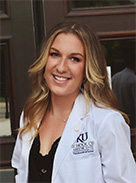
Erin Rauber ’21
Medical student at the University of Kansas Medical Center
“It’s truly the people that make Benedictine so special. The care and support that I felt in my relationships with incredible professors, dedicated classmates, and the best coach and teammates I could have asked for are what have helped me to be successful in my medical pursuits. The examples of servant leadership that I experienced daily set standards for how I wish to serve others as a physician. While the academic rigor of Benedictine prepared me well for a career in medicine, I believe it is the genuine relationships and community of compassion that I experienced throughout my four years that prepared me the most.”

Leandra Morgenthaler ’21
Medical student at the University of Missouri
“Attending Benedictine College was truly a gift, and I received immense support and encouragement through the pre-med program. The personalized guidance made the difference in planning my schedule, gaining research experience, and preparing for the MCAT and admissions process. Benedictine uniquely places the Catholic faith at the center of all the school does: not only did I receive a well-round education, I saw who I wanted to become in my mentors and peers. I hope I can take what I received at Benedictine to serve God in each patient I encounter in the future. If I had to choose all over again where to complete my pre-med studies, it would be Benedictine every time!”
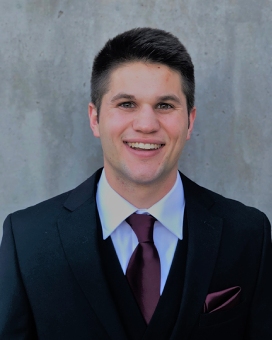
Gabe LeBeau ’20
Medical student at the University of Kansas Medical Center
“Through its small class sizes, gifted faculty, and extracurricular resources, Benedictine College offered me a welcoming environment that both challenged and excited me to pursue medicine. The robust education pre-med students receive not only leads to a successful medical school application, but it also prepares each student for the academic rigors they will meet in medical school. Yet more importantly, Benedictine College’s authentic Catholic liberal arts approach provides its students with the human formation necessary to cultivate the call to one day serve others as a physician. This culture taught me the importance of integrating, rather than separating, my life as a Catholic and my life in medicine, and for this I am incredibly grateful.”

Eden Anderson ’18
Medical student at the University of Washington
“Benedictine College is where I said ‘yes’ to my calling to become a physician. Inspired by the courage and dedication of my fellow pre-med biology students, and supported by the excellent faculty who pushed me to achieve high academic performance and provided opportunities for research experience, clinical exposure, and volunteer activities, it was here that I realized that I could live out my calling to medicine in an authentically Catholic way.”
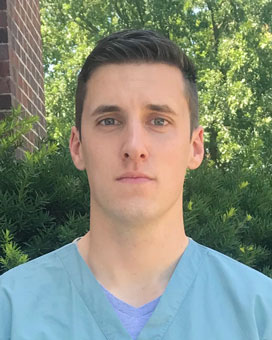
Brandon Betsch ’17
Medical student at the University of Kansas Medical Center
“Knowledgeable professors that are always available, a high set of standards that leave you well equipped for life after graduation, and an extremely supportive culture tailored to you make this department an ideal learning environment. If you are willing to put in the work, they have everything else you need to become a successful medical school applicant.”
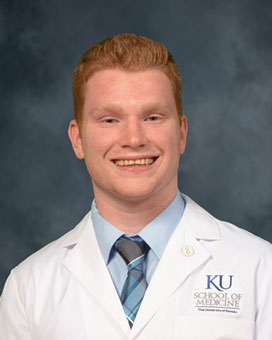
Jacob Cushing ’17
Medical student at the University of Kansas Medical Center
“The education I received at Benedictine College formed a foundation of faith and scholarship that helped me get into and succeed in medical school. I hope to use the same passion, humility and Christ-like leadership emulated by the faculty and staff of Benedictine to one day provide high-quality care to my patients.”
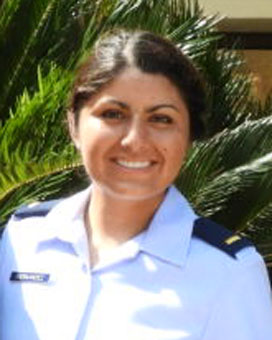
Rachel Hernandez ’17
2nd LT USAF, 3rd year medical student at Marian University College of Osteopathic Medicine
“I believe that choosing Benedictine as my undergraduate institution prepared me for my future medical career in more ways than I could have ever imagined. From my leadership classes, to the botany and micro labs, to the one-on-one interactions with my professors, I was able to develop critical skills that have enabled me to excel in my didactic coursework as well as to provide quality, compassionate care to my patients.”
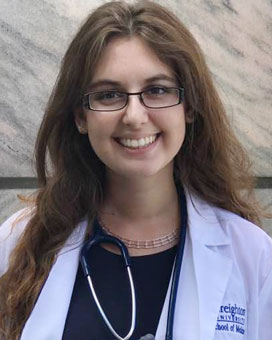
Emily Dyer ’16
Medical student at Creighton University
“My professors at Benedictine taught me to never stop asking questions and searching for answers. These principles have been essential in my medical school journey and will guide me throughout my career as a physician.”
Rigorous Liberal Arts Formation
Medical school is academically intensive, requiring a heavy load of memorization and the comprehension of complex scientific ideas. Furthermore, it necessitates the ability to critically analyze, process, apply, and communicate the learned information. A mixture of science and liberal arts classes will give a strong base for success in medical school.
Benedictine College offers a variety of rigorous courses in the sciences and liberal arts that will provide not only the prerequisites needed for medical school, but also the liberal arts framework that helps with critical analysis as well as written and oral communication.
Best Pre-Med Majors
There are common prerequisite courses you have to take to be admitted to medical school, and several majors will allow you to take these prerequisite courses within the major. These majors are academically rigorous, preparing you for the demands of medical school. Some examples of pre-med majors that can help students prepare for medical school are Biology, Biochemistry, Psychology, or Chemistry.
According to the Association of American Medical Colleges (AAMC), the most common major among matriculated medical students is biology or biochemistry (54% of matriculants), followed by chemistry (10% of matriculants) and psychology (10% of matriculants).
Outside the Classroom
Medical schools expect students to not only have a strong academic record, but also have a strong record of leadership and service outside of the classroom. Students should seek out service opportunities both at the college and in the broader community that demonstrate a desire to help others with compassion and empathy. Furthermore, students should demonstrate the ability to be a leader in different environments, establishing a clear intrapersonal maturity. Benedictine College has numerous opportunities to be involved in student organizations, academic groups, and community service projects both at home and abroad.
Strong Student-Faculty Relationships
Medical schools expect students to have strong letters of evaluations, vouching for the student’s academic aptitude and overall motivation. At Benedictine College, because of small class sizes and professor-guided research opportunities, students have numerous opportunities to interact one-on-one with professors. This builds relationships that will not only help with recommendation letter writing, but will provide sustainable professional relationships that will provide a basis of community learning during a student’s undergraduate career and beyond.
Contact
Martha Z. Carletti, Ph.D.
Director of Advising for Pre-Medical Healthcare Professions
Associate Professor of BiologyContact by Email
913.360.7557
Request Info
What classes should I take to prepare for Medical School?
| Recommended | |
| CHEM-1200/1201 | General Chemistry 1 with lab |
| CHEM-1210/1211 | General Chemistry 2 with lab |
| CHEM-2200/2201 | Organic Chemistry 1 with lab |
| CHEM-2210/2211 | Organic Chemistry 2 with lab |
| CHEM-3500 | Biochemistry 1 |
| PHYS-2000/2001 | College Physics 1 with lab |
| PHYS-2010/2011 | College Physics 2 with lab |
| PSYC-1000 | General Psychology |
| PSYC-2503 | Lifespan Development |
| THEO-3940 | Christian Bioethics |
| BIOL-1121 | General Biology 1 with lab |
| BIOL-1122 | General Biology 2 with lab |
| BIOL-3000/4000+ | *Upper-level biology courses |
*Molecular and Cellular Biology, Genetics, Immunology, Cell Physiology, Microbiology | |
Suggested Pre-Med Actvities
- Engage Intellectually
- Display a curiosity in learning different subjects.
- Strive to both learn and retain information.
- Attend lectures & academic discussions.
- Familiarize Yourself with the Healthcare Field
- Shadow a physician.
- Volunteer in hospitals or nursing homes.
- Work in the healthcare field.
- Develop your Research Skills
- Work with professors on individual research projects.
- Present research findings either at Discovery Day or any applicable science conferences.
- Perform Volunteer and Service Work
- Engage the community.
- Show empathy and understandings of others.
- Broaden appreciation of diverse backgrounds and experiences.
- Reflect on the Journey
- Recognize strengths and weaknesses.
- Seek opportunities to improve.
Medical Schools that have Accepted Recent Benedictine Graduates
- Rocky Vista University College of Osteopathic Medicine
- Oklahoma State University
- AT Still University, Kansas City University
- Kansas College of Osteopathic Medicine
- Saint Louis University
- University of Wisconsin
- University of Toledo College of Medicine
- University of the Incarnate Word School of Osteopathic Medicine
- University of Kansas Medical Center
- University of Kansas Medical Center – Wichita
- Kansas City University of Medicine and Biosciences
- Creighton University
- University of North Dakota
- University of Washington
- Washington State University
- University of Nebraska Medical Center
- University of Missouri
- University of Illinois
- University of Oklahoma
- Western Michigan University
- University of South Dakota
- University of Missouri – Kansas City
- University of Missouri
- Marian University College of Osteopathic Medicine
- Ross University School of Medicine
- American University of the Caribbean School of Medicine
- Des Moines University College of Podiatric Medicine and Surgery
- Rosalind Franklin University
- University of California-Irvine
Please see the Pre-Med Handbook for more information about this course of study.
Be sure to take advantage of the post-graduate support and guidance provided by the Benedictine College Student Success Center.
